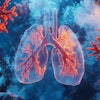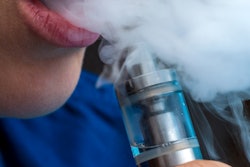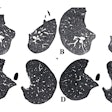
The U.S. Centers for Disease Control and Prevention (CDC) has updated its initial recommendation for healthcare providers on how to deal with vaping-associated illness, which the CDC has now named e-cigarette, or vaping, product use-associated lung injury (EVALI).
Following on the CDC's initial recommendations in early August based on limited data from the first reported EVALI cases, the new updated report summarizes national surveillance data describing clinical features of more recently reported cases and provides interim recommendations based on these data. Specifically, it details interim guidance for U.S. healthcare providers on initial clinical evaluation, suggested criteria for hospital admission and treatment, patient follow-up, special considerations for groups at high risk, and clinical and public health recommendations.
Imaging should be performed as part of the clinical evaluation of EVALI along with a physical exam and laboratory testing, according to the report. The authors, led by Dr. David Siegel of the CDC, noted that pulmonary infiltrates on chest x-ray and opacities on chest CT are radiographic findings consistent with EVALI.
They recommended that a chest x-ray should be obtained in all patients with a history of using e-cigarettes or vaping products if they show respiratory or gastrointestinal symptoms, particularly when accompanied by decreased oxygen saturation (< 95%). Chest CT might be useful when the chest x-ray result doesn't correlate with clinical findings or to evaluate severe or worsening disease, complications such as pneumothorax or pneumomediastinum, or other illnesses in the differential diagnosis, such as pneumonia or pulmonary embolism, according to the authors.
"In some cases, chest CT has demonstrated findings such as bilateral ground-glass opacities despite a normal or nondiagnostic [chest x-ray]," they wrote. "Among patients with abnormal [chest x-ray] findings and a clinical picture consistent with EVALI, a chest CT scan might not be necessary for diagnosis. The decision to obtain a chest CT should be made on a case-by-case basis depending on the clinical circumstances."
The CDC said that 49 states, the District of Columbia, and one U.S. territory have reported 1,299 cases of lung injury associated with the use of e-cigarette or vaping products. There have also been 26 deaths across 21 states.
"Rapid recognition by healthcare providers of patients with EVALI and an increased understanding of treatment considerations could reduce morbidity and mortality associated with this injury," the authors wrote.





















